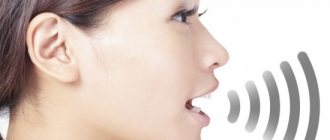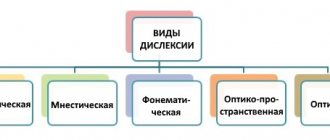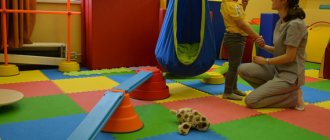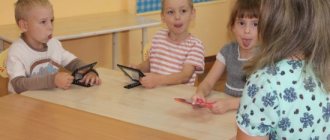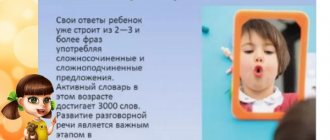Let's go to the speech therapist. First consultation
What questions can a speech therapist ask parents? What does a speech therapist examine?
Approximate structure of examination of a child from 2 to 11 years old and speech therapy report.
Below you can DOWNLOAD:
- Sample of writing a speech therapy report.
- Sample referral to a neurologist.
Personal data
- FULL NAME. child.
- Date of birth, age.
- Home address.
- Home phone.
- Educational institution (kindergarten/school).
- Curriculum, what program the child is studying in.
- Whether the program was duplicated or not, what grade (for a schoolchild).
- Information about parents: mother (full name, required age at the time of birth), father (full name, age, heredity).
- National language.
- Bilingualism
General anamnesis
- Unfavorable development factors.
- How did pregnancy and childbirth proceed?
- Heredity (are there any hereditary diseases).
- Past illnesses: before/after one year.
- Bruises, head injuries.
- Convulsions, whether there are convulsions at high temperatures.
Early development
- Holds his head with... (norm from 1.5 months).
- Sits from….. (normal from 6 months).
- Crawling from ..... (normal from 6-7 months).
- Costs from…..(normally from 10-11 months).
- Walks from .....(normally from 11-12 months).
- Recognizes loved ones from ....(normally from 2.5 - 3 months).
- The first teeth appeared from... (normally at 6-8 months).
- Number of teeth per year….(normally 8 teeth).
Speech anamnesis
- Walking in... (normal from 2 months).
- Babbling in .... (normal from 4-6 months).
- The first words...(normal for about a year).
- The first phrases in….(Normally from 1.5 to 2 years).
- Was speech development interrupted and for what reason?
- Use of gestures (replacement of speech, addition of speech).
- Attitude of family members to the child’s speech defect.
- Have you worked with a speech therapist?
- For how long?
- Results of sessions with a speech therapist.
Examination of the articulatory apparatus
- Lips.
- Teeth.
- Bite.
- Jaws.
- Sky.
- Language.
- Bridle.
- Uvulus.
Mobility survey
- Lips.
- Language.
Fine Motor Skills Test
- On the switching bridge
- On hold.
Hearing test
With normal hearing, the child should hear and repeat words and phrases spoken in a whisper in the residual air (after exhalation) at a distance of 6-7 meters from the auricle. When testing hearing, visual perception of speech should be excluded. The boundaries of perception of whispered speech are determined. The perception of a whisper at a distance of less than 3 meters indicates the need for special consultation at a hearing aid center to clarify the state of hearing.
Sound pronunciation survey
- Vowel sounds.
- Consonant sounds.
- Whistling, hissing, affricates.
- Sonorous.
- Voiced and voiceless.
- Fricatives.
Examination of the syllable structure of a word
- The words are polysyllabic.
- With a consonant cluster.
- Contain similar sounds.
Phonemic Awareness Test
- A chain of syllables.
- A chain of words.
- Differentiation of oppositional phonemes.
Vocabulary Survey
- Subject dictionary.
- Verb dictionary.
- Selection of synonyms.
- Selection of antonyms.
- Selection of related cognate words.
Examination of the grammatical structure of speech
- State of sentences or short stories.
- Using prepositions.
- The use of nouns in different cases.
- The use of cases depending on the numerals.
- Forming the plural from a singular noun and vice versa.
- Formation of the genitive plural form.
- The use of number in agreement with a noun.
- Formation of the diminutive form of a noun.
- Use of suffixes.
- Formation of adjectives from nouns.
- The use of prefixes in verbs.
Study of the sound composition of a word (from 5 years old)
- Highlighting the vowel at the beginning of the word and under stress.
- Isolating vowels in monosyllabic words.
- Highlighting the vowel at the end of a word.
- Isolating a consonant from the beginning of a word and a vowel from the end of a word.
- Independent selection of words starting with a given sound.
- Determining the place of a sound in a word.
- Definition of syllables in a word.
- Determining the number and sequence of sounds and letters.
- Definition of vowels and consonants.
- Designation of consonant letters by sound: voiced or voiceless, soft or hard.
Writing examination (from 7 years old)
- Copy words and sentences from handwritten text
- Copy words and sentences from printed text
- Write down lowercase and uppercase letters from dictation
- Syllable dictation.
- Dictation of words of different structures.
- Suggestions after listening once.
- Auditory dictation.
Reading survey (from 7 years old)
- Select vowels and consonants.
- Reading syllables.
- Reading words.
- Reading phrases.
- Reading specially selected texts.
It is important to promptly determine the presence/absence of speech disorders and take all measures to overcome them. A complete diagnosis of your child and consultation with determination of the further course of action can only be obtained at a face-to-face meeting with a specialist. No amount of online correspondence, chats on forums, or communities can provide complete information about the problem and qualified assistance to you and your child.
Olga Sakharovskaya
If a child does not speak, until what age is this normal?
As for children's silence and reluctance to speak, then, of course, in this matter everything is very individual. But if speech does not appear even at the age of three, it is worth contacting a speech therapist. What can you do at home? I highly recommend reading poetry and singing children's songs without finishing the ending. Naturally, before this, you sing a song or read the entire poem more than once so that the child learns and remembers them, and then you begin to leave them unsaid. This way you disinhibit him from the rhythm, and when you don’t finish the last syllable, the baby has a great need to finish the rhyme. Our brain is designed in such a way that it always strives to complete a melody or poem if it ends on an unstable note. Melodies that end on open syllables are very useful for speech development. For example, a children's song: “Far, far away, in the meadow they are grazing…”, where the parent will sing only the first two syllables of the word “far”, and the child will finish.
What should parents be wary of regarding their child’s speech development?
If this is not the first child, then most likely the parent himself will see some difficulties. If the baby is the first, then often mothers and fathers may not notice that something is going wrong. In this case, you can look at other children or listen to the opinions of strangers, but not too alarming or uninterested. You need to pay attention to the child’s behavior - is it different from the behavior of other children at this age? How targeted is it? Does your child have problems concentrating? How does he establish contact with adults, does he look them in the eyes? Signs of autism need to be checked. Be sure to pay attention to your understanding of speech. A common mistake parents make is that they often believe that the child understands speech, but in fact he guesses its content from the context. For example, a parent asks: “Bring me a glass,” and he himself points his finger at the glass, without noticing it. The fact is that when a child does not understand words, the parent unconsciously begins to duplicate them with gestures. In order to check whether a 2–2.5 year old child is able to understand speech, you can conduct the following experiment. Place the ball (or any other object) in a place where it doesn't usually go, such as the bathroom. And ask the baby to go there and bring it to you. If the child follows such purely verbal instructions, then everything is in order with understanding speech.
Why form the correct pronunciation?
Because sound pronunciation that is not corrected in time can cause writing and reading problems. And in adolescence, problems with speech can be perceived as a real misfortune and form painful complexes. Pronunciation defects make a person’s words “noisy” and often cause arbitrary rejection from the interlocutor. Correct speech sounds more convincing than broken speech. Is it possible to correct pronunciation as an adult? Yes, but it's more difficult to do.
Burda Media
My child started to stutter
Complaints that a child began to stutter almost simultaneously with the beginning of speaking or at the age of 2-3 years are quite often heard by specialists. Speech disruption is most often associated with the load that increases during this period on the child’s central nervous system. That is why these periods are called critical periods of speech development . The causes that provoke the occurrence of stuttering can be short-term or long-term psychological trauma, fear, somatic weakness of the child, and imitation of the speech of a stutterer. Stuttering is called primary if no more than two months have passed since the first manifestations.
If hesitation persists for more than two months, secondary phenomena arise - disorders of the central nervous system and physical health , disorders of speech and general motor skills (motor tension, stiffness of movements, incoordination). If stuttering occurs, it is recommended to immediately consult a specialist, since the greatest success is achieved when treatment is carried out in the first months after the onset of a speech disorder. First of all, you should contact a neurologist, psychologist or speech therapist. General recommendations boil down to limiting stimuli from the external environment and eliminating traumatic experiences.
A neurologist prescribes drug treatment using anticonvulsants, sedatives and hypnotics. During this period, sleep should be longer. Warm herbal baths are recommended before bed. Relatives need to create a calm home environment and eliminate stimulating stimuli (watching TV shows, playing on the computer). You should not draw the child’s attention to hesitations, much less scold or correct him. Come up with ways in which you can communicate with each other without speech - gestures, drawing pictures. Try to keep your child busy with calm games, construction, and modeling. Encourage your child to speak in a whisper, make sure that the pace of your speech is calm and the speech itself is smooth. Follow the recommendations of specialists who provide systematic counseling to the child.
What language to speak with your child: do our family speak several languages?
In a family where the child’s parents are of different nationalities, this issue becomes very relevant. When a child’s speech development proceeds without any peculiarities, the simultaneous acquisition of several languages does not present any difficulties for the child, especially since one of the languages still occupies a dominant position for the child. This language usually becomes the mother's native language, since she is the one who spends most of the time with the child. The same can be said about the conscious desire of parents to develop the linguistic abilities of the child, when parents who are fluent in several languages agree that they will speak with the child in different languages.
However, if the child’s speech development is disrupted, or lags behind the pace of normal development, such an approach to raising the child is not desirable, since it begins to inhibit the child’s speech development. If the child’s speech development is delayed or special, it is necessary to choose one language that the child will master. Some experts advise deviating from this recommendation when a child stutters. There are cases where speech symptoms of stuttering appear in one language, but do not appear when the child speaks another.
What are the main mistakes parents make when wanting to help their child speak faster?
There are two common opinions. The first of them is that you cannot talk to children and talk in childish language. I believe that it is useful to use such language, especially in play, so that the child learns to repeat and pronounce various syllables. We, speech therapists, ourselves use children's language in our work, especially with non-speaking children. The second piece of advice given to parents whose children have speech problems is: “Talk to them more.” There are children with basic listening speech disorder who simply “switch off” when you start talking to them a lot. On the contrary, a restrictive regime is recommended for such a child, in which an adult talks to him as clearly as possible. And if he asks the child for something, then he should not say quickly: “Please open this door,” or “Come on, come on, bring me a bucket.” And clearly: “open the door” and “bring the bucket.” Not for everyone, but for some children, adult verbosity does become a problem.
Article on the topic
7 commandments for parents: what to do if your child is silent
Nowadays, many children begin to speak quite late. What is this connected with?
If in the 1970-1980s every fourth child had speech disorders, now almost every preschooler has speech disorders. Among the reasons cited are poor ecology and poor medicine, but the main one is still a passion for gadgets. Scientists even coined a new term: “smartphone education”: parents introduce children to technology before they start talking. Research confirms that children who play with gadgets up to three years of age develop speech skills more slowly. Parents should constantly talk through everything that happens in their children's lives. We need to read, sing, tell fairy tales, poems, and not just children’s ones. If the child does not speak at all, you need to go to a speech therapist.
Anarthria
Anarthria is understood as the absence of speech associated with organic damage to the central and peripheral nervous systems, leading to paralysis of the speech motor muscles. Most often, anarthric disorders occur in severe forms of cerebral palsy. The inability to “speak” with anarthria is explained by damage to the parts of the brain that control the movements of the muscles of the speech apparatus - the tongue, lips, cheeks, palate, lower jaw, pharynx.
Damage to the brain structures that control the motor mechanism of speech can contribute to delayed maturation and disrupt the functioning of other structures. This leads to the fact that anarthria can be combined with other speech disorders, for example, alalia, which complicates special correctional assistance and the prognosis of the child’s speech development. You may be distressed by the fact that your child cannot speak like other children. Experts will help you find ways that will teach your child to communicate with you using gestures, pictograms (drawings - diagrams) or other means of communication available to him.
Should parents take part in the correction or is it better not to interfere with the specialist?
The help of moms and dads is necessary: it is the parents who help the child practice the tasks of the speech therapist at home and bring the skill to automatism. Of course, you need to study in a good mood, in a positive mood. It is important to do this regularly, carefully practicing the material. And everything will work out!
Burda Media
